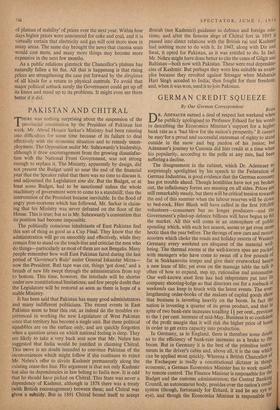PAKISTAN AND CHITRAL
HERE was nothing surprising about the suspension of the I provincial constitution by the President of Pakistan last week. Mr. A boul Hosain Sarkar's Ministry had been running into difficulties for some time because of its failure to deal effectively with the economic situation and to remedy unem- ployment. The Opposition under Mr. Suhrawardy's leadership, although it drew encouragement from the growing dissatisfac- tion with the National Front Government, was not strong enough to replace it. The Ministry, apparently by design, did not present the Budget until so near the end of the financial year that the Speaker ruled that there was no time to discuss it. and adjourned the Legislature sine die. But the Budget, or at least some Budget, had to be sanctioned unless the whole machinery of government were to come to a standstill; thus the intervention of the President became inevitable. In the flood of angry post-mortems which has followed, Mr. Sarkar is claim- ing that his Ministry was never defeated on the floor of the House. This is true; but so is Mr. Suhrawardy's contention that its position had become impossible.
The politically conscious inhabitants of East Pakistan find this sort of thing as good as a Cup Final. They know that the administration will go on smoothly and effectively, while they remain free to stand on the touch-line and criticise the men who do things—particularly as most of them are not Bengalis. Many people remember how well East Pakistan fared during the last period of `Governor's Rule' under General Iskandar Mirza- now the•President. Red tape was cut, things 'got done,' and a breath of new life swept through the administration from top to bottom. This time, however, the interlude will be shorter under new constitutional limitations; and few people doubt that the Legislature will be restored as soon as there is hope of a stable Ministry.
It has been said that Pakistan has many good administrators and many indifferent politicians. The recent events in East Pakistan seem to bear this out, as indeed do the troubles ex- perienced in working the new Legislature of West Pakistan since that territory has become a single unit. But these political squabbles are on the surface only, and are quickly forgotten when a question arises on which national feeling is deep. They are likely to take a very back seat now that Mr. Nehru has suggested that India would be justified in claiming Chitral. This move is no doubt intended to convince Pakistan of the inconveniences which might follow if she continues to reject Mr. Nehru's offer to divide Kashmir permanently along the existing cease-fire line. His argument is that not only Kashmir but also its dependencies in law belong to India now. It is odd that he should have picked on Chitral. This State was never a dependency of Kashmir, although in 1878 there was a treaty (with British encouragement) between them; and Chitral was given a subsidy. But in 1891 Chitral bound itself to accept British (not Kashmiri) guidance in defence and foreign rela- tions; and after the famous siege of Chitral fort in 1895 it passed into direct relations with the British raj and Kashmir had nothing more to do with it. In 1947, along with Dir and Swat, it opted for Pakistan, as it was entitled to do. In fact, Mr. Nehru might have done better to cite the cases of Gilgit and Baltistan—both now with Pakistan. These were real dependen- cies of Kashmir. But perhaps they were less suitable as exam' pies because they revolted against Srinagar when Maharaja Hari Singh acceded to India; then fought for their freedom; and, when it was won, used it to join Pakistan.


































 Previous page
Previous page